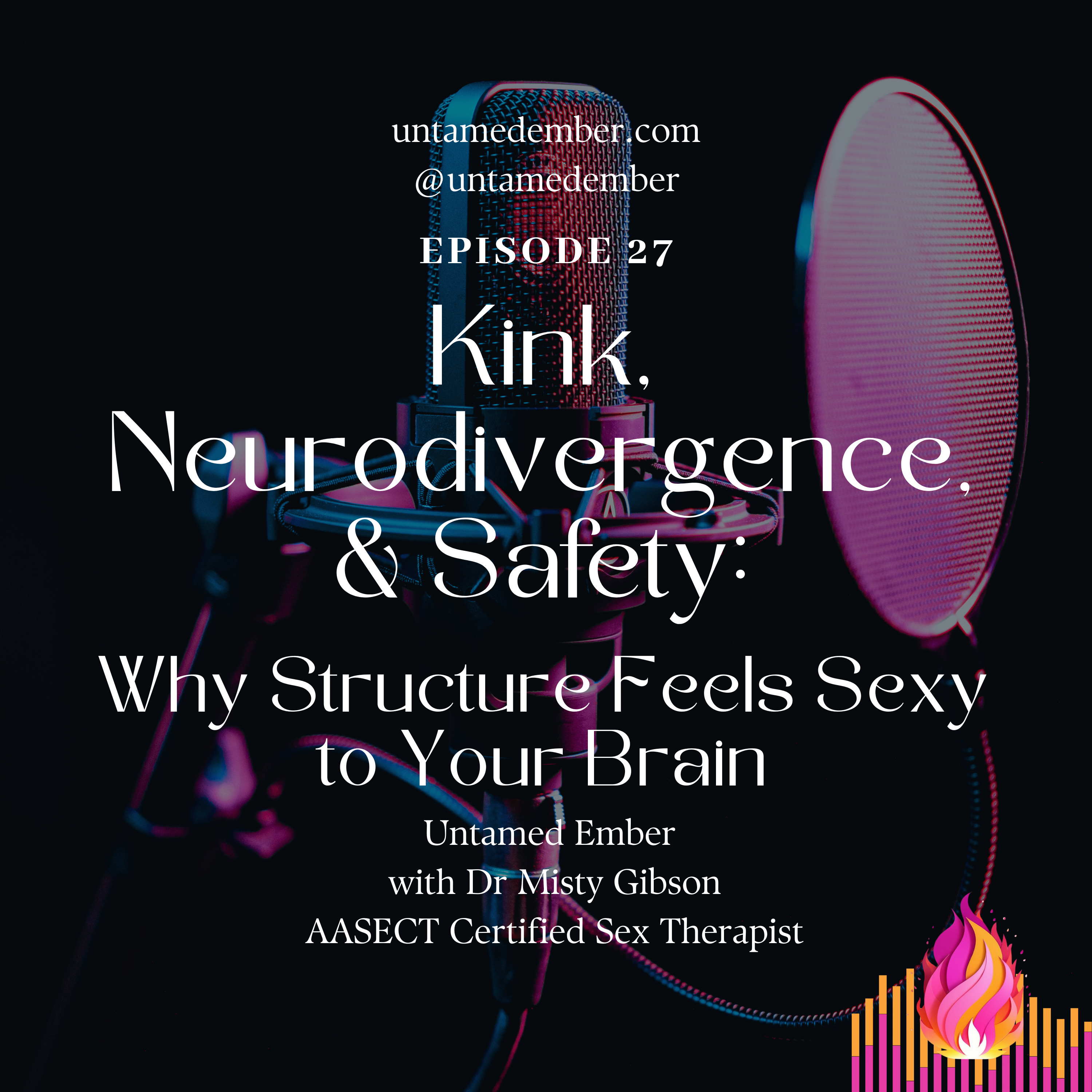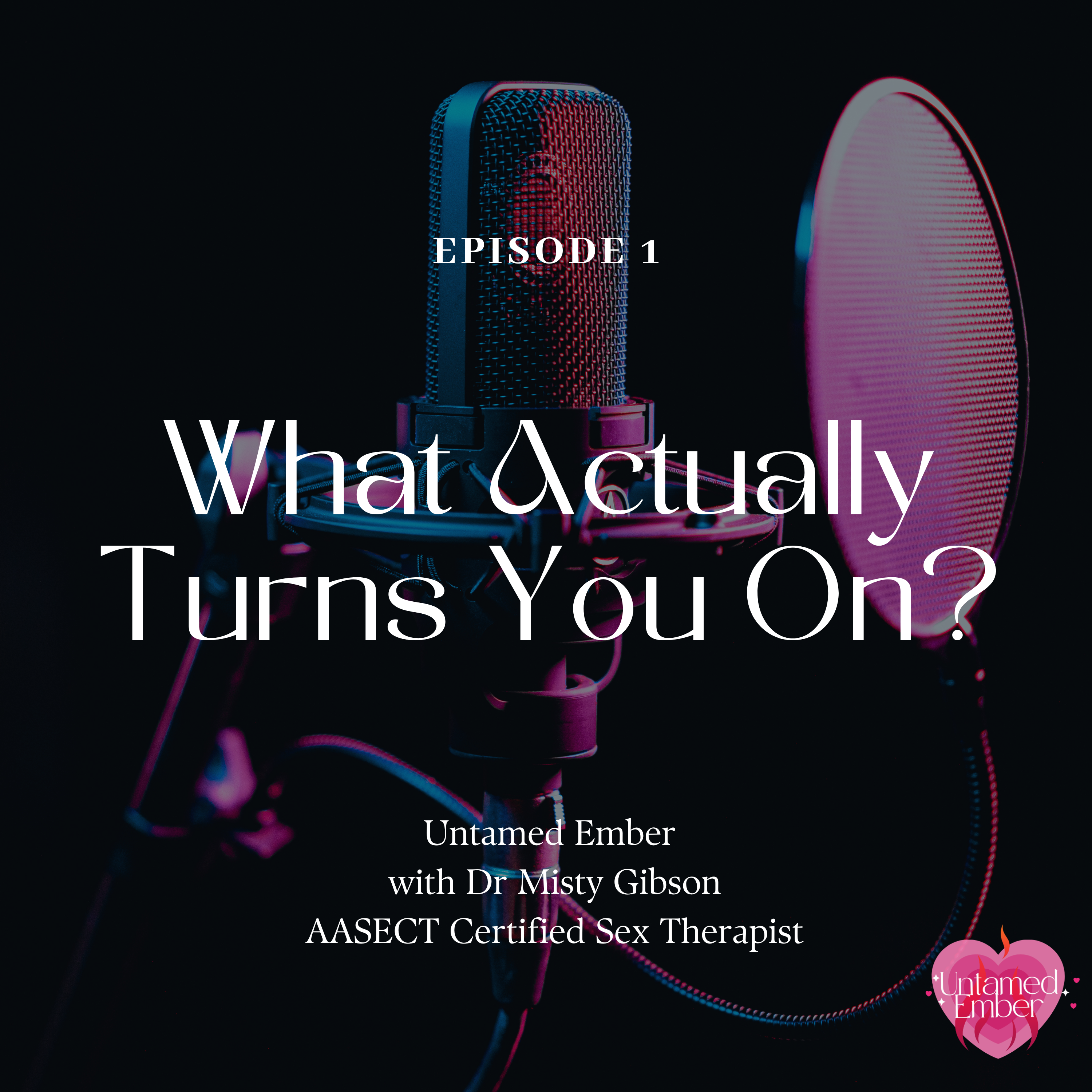Episode Transcript
[00:00:00] The ropes are soft, the cuffs are padded. The safe word is already agreed on. And for the first time all week, your brain actually shuts up. No social script to decode. No guessing what your partner wants. Just the sweet relief of knowing exactly what happens next. Your shoulders drop, your breathing deepens. That constant background hum of am I doing this right? Feel finally goes quiet. Because for once, maybe for the first time in your entire sexual life, you don't have to read anyone's mind. The rules are clear, the boundaries are explicit, and your nervous system can finally exhale.
[00:00:41] If that moment sounds like paradise to you, today's episode is about to validate everything your body's been trying to tell you. Hey, loves. Welcome back to another episode of untamed ember. I'm Dr. Misty. Welcome. Where we talk about sex, shame, the nervous system, and why your brain might be secretly craving a dominatrix with a color coded spreadsheet.
[00:01:04] Today we're diving into something that makes vanilla culture clutch its pearls. But it makes perfect sense to anyone whose brain runs a little bit slower in processing than the standard iOS.
[00:01:18] Why kink might not just be hot for you, it might be necessary.
[00:01:22] Because here's what nobody talks about for neurodivergent brains. Trauma, impacted nervous systems. And anyone who's ever felt like intimacy comes with an instruction manual written in invisible ink. Structured play isn't just about getting your freak on. It's about finally feeling safe enough to get your anything on.
[00:01:41] Welcome to Kink neurodivergence and Safety. Why structure feels sexy to your brain. Where we explore how clear expectations, explicit consent and a well negotiated scene might be. Exactly what your overstimulated, hypervigilant, rule seeking brain has been desperately craving. Let's start with something that might blow your mind. That relief you feel when someone gives you clear, explicit instructions. That's not you being submissive or needy. That's just your nervous system recognizing safety. Think about it. How much mental energy do you spend every day trying to decode social cues?
[00:02:18] Guessing what people want from you? Analyzing tone of voice, facial expressions, body language? Trying to figure out the invisible rules that everyone else seems to know instinctively. For neurodivergent folks especially, this is exhausting.
[00:02:33] We're constantly running background programs, trying to translate neurotypical social scripts, wondering if we missed something, second guessing our responses. By the time we get to intimate moments, our brains are already fried from a day of social calculus.
[00:02:49] Now imagine walking into a sexual encounter where every rule is explicit. Where boundaries aren't hints to be decoded, but Clear statements to be respected where maybe doesn't exist because everything's been negotiated beforehand. Where your partner tells you exactly what they want instead of expecting you to guess. That's not just hot, that's nervous system regulation and action.
[00:03:14] When kink communities talk about negotiation, they're not just planning a scene. They're creating what I call neurobiological safety nets. They're removing the guesswork that keeps so many of us stuck in hypervigilant mode during intimacy. Your neuroception, that unconscious safety radar we've talked about in previous episodes, is constantly scanning for threats. And you know what registers as threatening to a neurodivergent or trauma impacted system?
[00:03:42] Uncertainty. Ambiguity.
[00:03:45] Having to perform social intuition. When your brain doesn't run that software naturally, kink flips this entire dynamic instead of leaving you to decipher mysterious vanilla scripts like just go with the flow or do what feels natural.
[00:04:01] Structured play gives your nervous system exactly what it needs. Predictability, clarity, and the radical safety of knowing what comes next.
[00:04:11] It's the difference between being thrown into an improv scene with no warning and walking onto a stage with a script in your hand, clear direction, and a supportive cast who's actually read the same playbook you have. For many of us, this isn't just a preference. It's the difference between staying present in our bodies versus dissociating the moment things get intimate.
[00:04:33] Because when your brain doesn't have to work overtime interpreting social cues, it can actually focus on pleasure.
[00:04:40] Revolutionary concept, right?
[00:04:42] Now let's talk about something that should be obvious, but somehow it isn't.
[00:04:47] The radical difference between how consent works in vanilla culture versus kink culture. In mainstream sexual scripts, consent is often treated like some vague, implied understanding. We're both here, we're both adults. We'll figure it out as we go. The assumption is that everyone's reading from the same playbook, that social cues are universal, that no means no covers all the complexity of human desire and boundaries. But here's the thing. For those of us whose brains don't process social information in standard ways, this system is fundamentally broken. We're expected to navigate intimate encounters using neurotypical social software. We don't have reading cues, we can't interpret. Communicating in a language that doesn't match how our minds work, kink culture says, fuck that. Let's actually talk about this. In structured play, negotiation isn't foreplay. It's the foundation. Before anyone touches anyone, you're discussing activities, limits, safe words, aftercare needs. You're talking about what you want what you absolutely don't want and everything in between.
[00:05:59] You're creating a shared vocabulary for pleasure and boundaries that doesn't rely on mind reading or cultural assumptions. This explicit negotiation does something magical for nervous systems that have learned to associate ambiguity with danger. It creates what therapists call earned security.
[00:06:19] Your system learns that this person, the situation, this dynamic, is trustworthy because trust has been explicitly built for through communication, not assumed through cultural scripts.
[00:06:31] For someone whose brain is constantly asking, am I safe? Am I doing this right? What do they actually want from me? Having those questions answered up front is like finally being able to breathe. And here's what's beautiful. This doesn't kill spontaneity. It creates a container for freedom.
[00:06:50] When you know the boundaries, when you've established the rules, when safe words are in place, you can actually let go. Within that structure, you can be present, you can explore, you can play. Because the safety net is already there. I've worked with clients who describe their first negotiated kink scene as the first time they felt genuinely present during sex. Not performing pleasure they didn't feel, not dissociating to get through it, not constantly monitoring their partner's reactions to figure out if they were doing it right. Just present in their bodies, feeling sensation without the overlay of social anxiety.
[00:07:28] That's not just better sex, that's nervous system healing in action.
[00:07:32] Let's dive deeper into the neuroscience of why structured intimacy works so well for brains that run on different operating systems. Remember our friend polyvagal theory? Those three neural circuits that determine whether we feel safe, threatened, or completely overwhelmed?
[00:07:49] Kink culture has accidentally created one of the most effective frameworks for keeping people in that sweet spot of ventral vagal activation, that calm, connected, socially engaged state where pleasure is actually possible. Here's how it works. When you enter a well negotiated scene, your nervous system receives multiple simultaneous safety cues. The rules are clear, the roles are defined. The exit strategy is explicit. Your partner has demonstrated their trustworthiness through thorough communication.
[00:08:22] Your brain doesn't have to constantly scan for threats because the environment has been intentionally crafted for safety. This is co regulation at its finest. Your nervous systems are literally synchronizing around shared agreements rather than constantly trying to interpret each other's unspoken needs and boundaries.
[00:08:42] And here's something fascinating. For many neurodivergent folks, the intensity of certain kink activities actually provides optimal nervous system stimulation. That rope pressing against your skin, giving your proprioceptive system your sense of where your body is in space. Clear, consistent input. Those commands from a dominant partner they're taking the burden of decision making off of your potentially overwhelmed executive function.
[00:09:09] Some people need the controlled intensity of a scene to actually feel their bodies fully. The sensation provides enough stimulation to overcome dissociation or numbness, while still maintaining the safety of clear boundaries and negotiated consent. Let me share a story that illustrates this perfectly. I worked with someone, let's call them Sylvie, who had struggled with chronic dissociation during sex for years.
[00:09:35] They'd tried everything. Mindfulness practices, therapy, different positions, different partners. Nothing seemed to help them stay present when things got intimate. Then Sylvie discovered rope bondage. Not because they were inherently submissive or had some deep psychological need to be restrained, but because the consistent pressure of the rope gave their nervous system the sensory input it needed to stay embodied.
[00:10:01] The negotiation process gave them language for their needs that they never had before.
[00:10:06] The clear beginning, middle and end of a scene gave their brain the structure that it craved. For the first time in their adult life, Sylvie could be fully present during intimate touch, not because the kink fixed them, but because it provided the environmental supports their particular nervous system needed to feel safe enough for embodiment.
[00:10:27] This is why I get so frustrated when people pathologize kink or treat it like it's inherently unhealthy. For many neurodivergent and trauma impacted people, structured play isn't about acting out damage. It's about creating the conditions where healing becomes possible.
[00:10:43] Now let's get practical about what nervous system informed kink actually looks like. Because not all kinky spaces are automatically neurodivergent or trauma friendly.
[00:10:53] For those of us with sensory processing differences, traditional kink gear and environments can be sensory nightmares. Leather that feels like sandpaper. Scented massage oils that trigger migraines. Rope that's too scratchy. Music that's too loud. Lighting that's too bright or too dim. But here's the beauty of negotiation based play. You get to customize everything for your specific sensory needs. Unscented products only. Cotton rope instead of jute.
[00:11:22] Hand signals instead of verbal safe words for when you're non Speaking.
[00:11:26] Breaks every 20 minutes. Because your nervous system needs regular check ins to stay regulated. This isn't being high maintenance. This is being honest about what your body needs to feel safe. And in good kink culture, these needs are not just accommodated, but celebrated as essential information for creating hot, connected experiences.
[00:11:46] Let's talk about aftercare, because this might be the most crucial element for neurodivergent and trauma impacted players. Aftercare isn't just cuddling after intense play. It's Intentional nervous system support during the transition back to baseline. After any intense experience, your nervous system needs help processing what just happened. For neurotypical folks without trauma histories, this might be simple. But for those of us whose systems are more sensitive to activation and deactivation cycles, aftercare becomes essential nervous system medicine. This might look like specific types of touch that help you feel grounded verbal reassurance that everything that just happened was consensual and good Time to process any emotions that came up during the scene, or physical comfort like blankets, water and snacks, and space to be non verbal if you needed it. The key is negotiating your aftercare needs beforehand, not trying to figure them out when you're already in a vulnerable post scene state.
[00:12:50] Your brain needs to know that the support will be there before it feels safe enough to fully let go during play. And here's something crucial. Good kink culture normalizes stopping mid scene. Your consent isn't just required at the beginning, it's an ongoing process. If something shifts in your body, if you need to pause, if a sensation or position triggers something unexpected, using your safe word isn't failing, it's succeeding at listening to your body's wisdom. For those of us who have learned that our needs were inconvenient, that we should push through discomfort to avoid disappointing others, this level of consent culture can be revolutionary. Your boundaries aren't obstacles to work around. They're essential information for creating experiences where everyone involved can be fully present.
[00:13:39] Okay, so now let's address the elephant in the room, the stigma that surrounds kink, especially for those of us who are already marginalized.
[00:13:48] Mainstream culture loves to pathologize kinky desire, especially when it comes from people whose sexuality is already queer folks, disabled folks, neurodivergent folks, trauma survivors. We're told that our desire for structure, for explicit consent, for non traditional power dynamics must be evidence of our brokenness rather than our wisdom.
[00:14:11] But here's what's wild Vanilla culture's approach to sex. Unclear consent, mind reading expectations, performance pressure, no negotiation, no aftercare would be considered emotionally unsafe in literally any other context.
[00:14:26] Imagine if we approached friendship or work relationships the way mainstream culture approaches sex. No clear agreements, no discussion of needs or boundaries, just expectations that everyone will magically know what everyone else wants. That would be chaos. And yet somehow this is considered the normal way to approach intimacy. Meanwhile, kink culture, with its emphasis on explicit consent, thorough communication, negotiated boundaries, and intentional aftercare, gets painted as the dangerous option. The backwards logic is staggering.
[00:15:02] The truth is, many neurodivergent and trauma Impacted people find kink safer than vanilla sex precisely because it doesn't rely on the neurotypical social intuition that we don't naturally possess. The structure isn't a limitation, it's an accessibility feature. But accessing kink communities isn't always straightforward, especially for those dealing with intersectional marginalization.
[00:15:25] Many kink spaces still struggle with ableism, fatphobia, racism, and transphobia.
[00:15:32] Finding communities that are truly inclusive and trauma informed requires vetting and patience. This is why building your own support network, whether that's finding inclusive local communities, connecting with other neurodivergent kinky folks online, or working with sex positive therapists who understand both trauma and alternative sexuality, becomes so important.
[00:15:56] Your desire for structure, explicit consent, and negotiated intimacy isn't pathology.
[00:16:01] It's your nervous system telling you what it needs to feel safe enough for genuine connection. And that wisdom deserves to be honored, not stigmatized. As we wrap up today's exploration of kink neurodivergence and safety, I want to leave you with this.
[00:16:16] Your craving for structure and intimacy isn't evidence of dysfunction. It's evidence of self knowledge. Your brain knows what it needs. Your nervous system has been trying to tell you what would help it feel safe enough for for genuine pleasure. That desire for clear agreements, explicit consent, negotiated boundaries, and intentional aftercare. That's not you being difficult or damaged. That's you being wise.
[00:16:41] For too long we've been told that good sex should be spontaneous, intuitive, natural. But for those of us whose brains work differently, whose nervous systems carry the impact of trauma, whose bodies have learned that ambiguity equals danger, spontaneity without structure is not freedom, it's chaos. Structure creates the container within which genuine freedom becomes possible.
[00:17:04] Clear agreements allow for authentic expression. Explicit consent enables real negotiated boundaries make true intimacy accessible.
[00:17:14] So if your body has been craving intimacy with a side of clarity, if your brain lights up at the thought of color coded safe words and negotiated scenes, if the idea of having all the rules spelled out beforehand sounds like heaven rather than restriction, trust that wisdom. Your nervous system is not broken. It's just speaking a different language than what vanilla culture teaches.
[00:17:38] And there's an entire community of people who are fluent in that language, who understand that the hottest thing you can say in bed might be. Let's talk about this first.
[00:17:48] This week I invite you to get curious about what structure might look like in your intimate life.
[00:17:54] Maybe it's having explicit conversations about boundaries you've never named. Maybe it's negotiating aftercare needs with current partners. Maybe it's simply allowing yourself to want what you want without pathologizing that desire.
[00:18:09] And if you're craving more content like this, make sure to join our free weekly newsletter@untamed ember.kit.com where you'll get bonus podcast episodes, freebies, and first access to everything we're creating to support your journey toward embodied liberation.
[00:18:26] Until next week, this is Dr. Misty with Untamed Ember, reminding you that your desire for clear rules isn't controlling, it's caring. Your need for explicit consent isn't neurotic, it's necessary. And your brain's love affair with structure might just be the key to unlocking the authentic intimacy you've been craving all along.
[00:18:46] Subscribe to this podcast wherever you get your podcasts, and let's keep dismantling the myths about what's safe sex sexy connection can look like. See you next episode, you beautiful boundary setting rebels.




